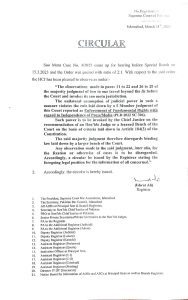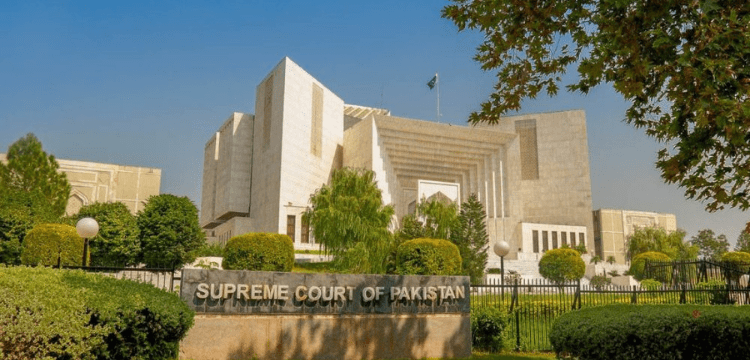[vc_row][vc_column][vc_column_text dp_text_size=”size-4″]ISLAMABAD: The bench hearing the Pakistan Tehreek-e-Insaf (PTI) petition against the postponement of Punjab elections was disbanded again on Friday after Justice Jamal Khan Mandokhail recused himself
Previously, the bench was disbanded after Justice Aminuddin Khan recused himself, citing the fact that he was a signatory to an order issued by a different bench. He had proposed that all cases brought under Article 184(3) of the Constitution be postponed.
However, a new four-member bench was formed earlier today, excluding Justice Khan.
Justice Mandokhail stated that yesterday’s order, which stated that the remaining SC bench disagreed with Justice Aminuddin and believed that the hearing and proceedings in the petition were unaffected, was passed without his consultation, making him a “misfit” on the bench.
Justice Mandokhail stated in a handwritten note on the order that “the order was not dictated in court, nor was I consulted by the honourable chief justice.”
Also Read: SC five member bench hearing polls delay case dissolved.
“However,” he added, “the impact of the judgement requires consideration in court.”
Chief Justice of Pakistan (CJP) Umar Ata Bandial stated that a decision on the composition of a new bench would be issued soon.
CJP disregards Justice Isa’s and Aminuddin’s judicial orders
On Friday, Chief Justice of Pakistan (CJP) Umar Ata Bandial exercised administrative power and ignored a judicial order issued by Justices Qazi Faez Isa and Aminuddin Khan, claiming that it violated the rules established by a five-judge larger bench.
On March 29, a Supreme Court bench ordered that all cases heard by various Supreme Court benches under Article 184 (3) of the Constitution be postponed until amendments to the Supreme Court Rules 1980 regarding the CJP’s discretionary powers were made.
The verdict was issued by a three-judge bench led by Justice Qazi Faez Isa and comprised of Justice Aminuddin Khan and Justice Shahid Waheed, with Justice Waheed dissenting.
When the five-judge bench resumed hearing the polls postponement case yesterday, Justice Aminuddin Khan, who had endorsed Justice Isa’s ruling on Wednesday, announced his intention to recuse himself from hearing the case.
Concerning Justice Isa’s order, the chief justice issued a circular stating that the “observations made in paras 11 to 22 and 26 to 28 of the majority judgement of two to one travel beyond the lis before the Court and invoke its suo motu jurisdiction.”
It went on to say that “unilateral assumption of judicial power in such a manner violates the rule laid down by a five-member judgement of this Court reported as Enforcement of Fundamental Rights with regard to Press/Media Independence.”
“Such power shall be exercised by the Chief Justice on the recommendation of an honourable judge or learned bench of the Court, in accordance with the criteria set out in Article 184(3) of the Constitution.”
Article 184(3) of the Constitution of Pakistan gives the Supreme Court the extraordinary power to assume jurisdiction over any “question of public importance with reference to the enforcement of any … Fundamental Rights”.
The circular stated that “the said majority judgement, therefore, disregards binding law laid down by a larger bench of the Court”.
“Any observation made in the said judgement, inter alia, for the fixation or otherwise of cases is to be disregarded,” it concluded, adding that the circular was issued by the Registrar stating the foregoing legal position for the information of all concerned.

The circular comes just days after the Senate passed the Supreme Court (Practice and Procedure) Bill 2023, which seeks to limit the top judge’s suo motu powers in an individual capacity, despite opposition from the opposition.
The bill received sixty votes in favour and 19 votes against it. Azam Nazeer Tarar, Law Minister, moved in the house to present the bill, which met under the chairmanship of Sadiq Sanjrani.
The motion by the opposition to refer the bill to the standing committee was defeated, while a motion to pass it immediately was approved.[/vc_column_text][/vc_column][/vc_row]











